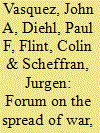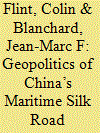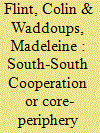|
|
|
Sort Order |
|
|
|
Items / Page
|
|
|
|
|
|
|
| Srl | Item |
| 1 |
ID:
103938


|
|
|
|
|
| Publication |
2011.
|
| Summary/Abstract |
Social network analysis is used to show that underlying systemic structure made war more likely to spread in 1914 than earlier in the century. The changing network density of three diffusion processes is seen as crucial-alliances, interstate rivalries, and territorial disputes. The findings show that the density of each of these factors increased in the system in varying degrees from 1900 to the end of 1913. How the three diffusion processes interacted with contiguity to make the local war between Austria-Hungary and Serbia spread to become a world war is explained both theoretically and historically.
|
|
|
|
|
|
|
|
|
|
|
|
|
|
|
|
| 2 |
ID:
103937


|
|
|
| 3 |
ID:
153515


|
|
|
|
|
| Summary/Abstract |
China’s “One Belt, One Road” project is comprised of two components: the Maritime Silk Road Initiative (MSRI) and the Silk Road Economic Belt (SREB)—that were announced separately in 2013. Each component has the potential to transform the global geopolitical landscape through the construction of interrelated infrastructure projects including ports, highways, railways and pipelines. Such hard infrastructure requires the complementary construction of soft infrastructure, such as free trade and investment agreements, and other accords. We introduce a special section focusing specifically on the geopolitics of the MSRI that stems from a workshop hosted in November 2015 in Shanghai. The origins, scope and content of the MSRI are described, along with a summary of the current literature discussing the project, and dominant geopolitical representations. The MSRI is a geopolitical project that involves a number of actors (governments, private companies and Chinese state-owned enterprises) at a number of geographic scales (cities, provinces, states and continents). Arrghi’s twin logics of territorial and economic power help frame and connect the papers of the special section to illustrate the complexity and dynamism of the geopolitics of the MSRI. The articles provide insights into the geopolitics of a large connectivity project.
|
|
|
|
|
|
|
|
|
|
|
|
|
|
|
|
| 4 |
ID:
187781


|
|
|
|
|
| Edition |
4th ed.
|
| Publication |
Oxon, Routledge, 2022.
|
| Description |
xvi, 307p.: figures, tables, boxespbk
|
| Standard Number |
9780367686758
|
|
|
|
|
|
|
|
|
|
|
|
Copies: C:1/I:0,R:0,Q:0
Circulation
| Accession# | Call# | Current Location | Status | Policy | Location |
| 060245 | 320.1/FLI 060245 | Main | On Shelf | General | |
|
|
|
|
| 5 |
ID:
153202


|
|
|
|
|
| Edition |
3rd ed.
|
| Publication |
Oxon, Routledge, 2017.
|
| Description |
xv, 317p.: figures, tables, boxespbk
|
| Standard Number |
9781138192164
|
|
|
|
|
|
|
|
|
|
|
|
Copies: C:1/I:0,R:0,Q:0
Circulation
| Accession# | Call# | Current Location | Status | Policy | Location |
| 059096 | 320.12/FLI 059096 | Main | On Shelf | General | |
|
|
|
|
| 6 |
ID:
072815


|
|
|
|
|
| Publication |
London, Routledge, 2006.
|
| Description |
xvi, 237p.
|
| Standard Number |
041534493X
|
|
|
|
|
|
|
|
|
|
|
|
Copies: C:1/I:0,R:0,Q:0
Circulation
| Accession# | Call# | Current Location | Status | Policy | Location |
| 051446 | 320.12/FLI 051446 | Main | On Shelf | General | |
|
|
|
|
| 7 |
ID:
092324


|
|
|
|
|
| Publication |
2009.
|
| Summary/Abstract |
The changing geographical foci of the geopolitical code of the United States are examined by a content analysis of the presidential State of the Union Speeches between 1988 and 2008, the last year of President Reagan's term through the presidency of George W. Bush. The State of the Union speeches are interpreted as geopolitical discourse within a structural setting, using seven foreign-policy paradigms as an organising framework. The empirical findings illustrate an increase over time in the number of regions and countries mentioned in the speeches. Also, notable differences between administrations in terms of their advocacy of globalist or regionalist policies and emphasis upon allies or adversaries are found.
|
|
|
|
|
|
|
|
|
|
|
|
|
|
|
|
| 8 |
ID:
178066


|
|
|
|
|
| Summary/Abstract |
The geopolitics of development are explored through an examination of development assistance to two African countries as a mechanism of competition between China and the US. The processes of competition include the actions and rhetoric of African leaders. We define a geopolitical context for the agency of political leaders and opinion-makers in Ghana and Zambia. The geopolitical context consists of the structure and dynamics of the world-economy; especially the competition to capture the newest round of innovations and the related need to establish supply chains of raw materials from peripheral countries. By analysing quotes from Ghanaian and Zambian elites we identify the possibility for geopolitical agency in the periphery that is constrained by, and largely maintains, China-US competition and the core-periphery hierarchy of the world-economy.
|
|
|
|
|
|
|
|
|
|
|
|
|
|
|
|
|
|
|
|
|